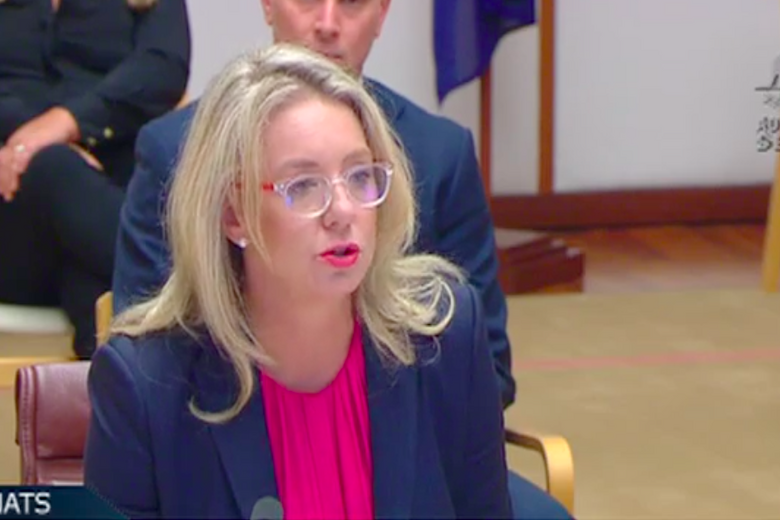
A report into the so-called sports rorts scandal has described an “exercise in pork barrelling” by the federal government and highlights a culture of “oversubmissiveness and deference” on the part of public servants.

The Select Committee on Administration of Sports Grants examined evidence that the former sports minster Bridget McKenzie, Prime Minister Scott Morrison and the PM’s office intervened in the grants process to win political favour for coalition candidates at the 2019 federal election.
“The evidence examined by the committee clearly shows that the minister deviated from the merit-based assessment process adopted by Sport Australia’s program administrators and assessment panel,” the report says.
It says there was broad recognition by the Senate that grant decisions were made for political purposes, that the PM and his office were “intimately involved in decision making” and that many deserving applicants missed out because they weren’t in marginal or targeted electorates.
“This inquiry has exposed an overt and organised practice by the government of inappropriately using Commonwealth grants for partisan political purposes, and a failure to act transparently and accountably in relation to the expenditure of public monies,” it says.
Role of public service
The report highlights the role of the public service, recounting how former NSW Auditor General Tony Harris expressed concerns about the reluctance of public servants to advise ministers about the limits of their powers.
Another witness, Emeritus Professor Richard Mulgan of the Crawford School of Economics and Government at the ANU, spoke about a prevailing “culture of oversubmissiveness and deference within the bureaucracy towards ministers”.
Professor Mulgan proposed that the role of the Australian Public Service Commissioner be enhanced in order to uphold procedural and administrative integrity and address the prevailing ‘culture of oversubmissiveness and deference within the bureaucracy’ towards ministers.
Final report of the Select Committee on Administration of Sports Grants
The APS needed to actively defend the integrity of grants rules and guidelines and not allow ministers to override procedural contraints on their powers, Professor Mulgan told the committee.
The committee said evidence came to light during the hearings that showed Sport Australia and its board were “effectively muted in the decision making process”, and recommendations made to the minister were ignored in favour of applicants the minister selected.
“The committee is concerned about the evidence showing Sport Australia’s inability to withstand pressure from the minister’s office, particularly on issues where program staff had indentified clear risks with the minister’s decision making,” it says.
Call for release of Gaetjens report
The committee’s final report, tabled on Friday, recommends the government immediately fund all projects that were assessed as meritorious and recommended by Sport Australia but dismissed in the final ministerial funding decision.

It also recommends better communication with applicants and the development of a national policy framework for community sport infrastructure, and says the authority of the minister in relation to grant approvals be clarified.
The committee wants the PM to explain to parliament his full role in the allocation of grants and calls for the establishment of a national integrity commission with the powers of a Royal Commission.
It’s also given a May 12 deadline for the tabling a a raft of documents relating to the grants including memos, spreadsheets and a full unredacted list of grant applicants, as well as the Gaetjens report into the matter, which remains secret.
The report by DPMC Secretary Phil Gaetjens found shortcomings in the administration of the program but said Senator McKenzie didn’t breach the standards in terms of fairness.
However it found she did breach them in relation to a conflict of interest involving an organisation that received funding. Senator McKenzie resigned from the ministry in the wake of the report.
Distribution bias
Almost $30 million in funding was made available for the grants program in 2018 but Sport Australia received 2056 application for grants amounting to $397 million.

Funding of $100 million was eventually distributed to 684 projects over three rounds.
In report released in January 2020 Auditor General Grant Hehir found the program wasn’t informed by appropriate assessment processes and sound advice, and that successful applicants weren’t the most meritorious ones.
Mr Hehir later told the committee that were was “evidence of distribution bias in the award of grant funding”, with a focus on projects in targeted or marginal seats.
Nine of the ten electorates that received the most funding were in this category, while seats not classified as marginal or targeted got about half the funding they would have if the grants had been awarded on merit.
Senator McKenze has rejected the suggestion that the decision making process was politicised and said no rules were broken. She also insisted there had been a “fair and broad distribution of grants”.
Comment below to have your say on this story.
If you have a news story or tip-off, get in touch at editorial@governmentnews.com.au.
Sign up to the Government News newsletter
This report highlights the need of a REAL National Integrity Commission.
The report in 4.72-4.76 is a scathing about the toothless of the proposed watchdog. Whats needed is an ICAC or the equivalent in the other States of Australia.
The NIC need to be National standard of Integrity and enforcement mechanisms.
But the proposed NIC Act 2018 2, Is in real terms well below the current standards of the States in the Federation agencies.
As for blaming the Ministers Public Servant for being timid. the lack of a NIC with any teeth. is a massive disincentive.
Simply It has No Teeth, no public hearings. So, the public can easily be skeptical in the rorts that this report exposed will be Again swept under the carpet in the future!